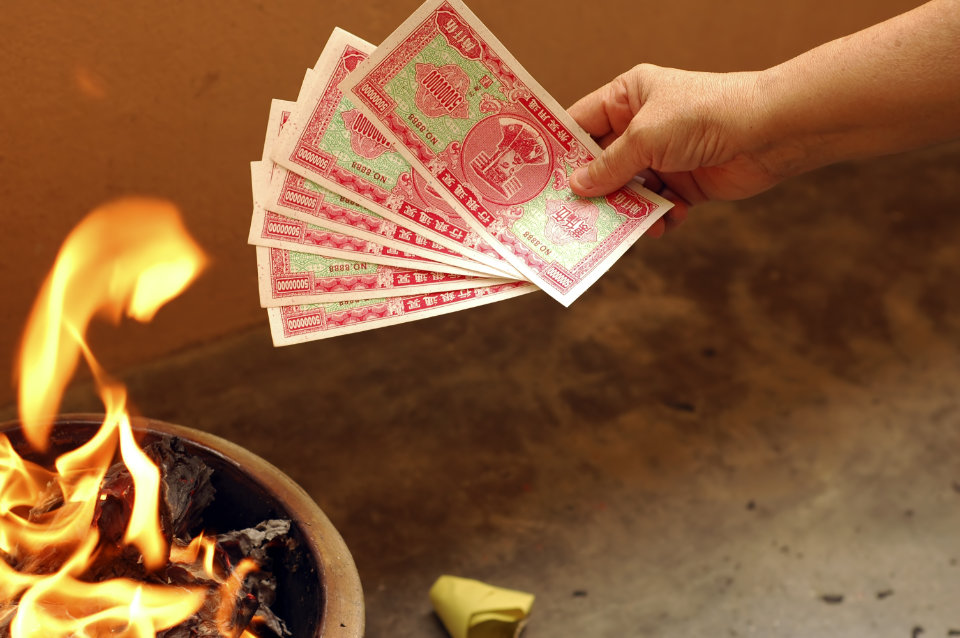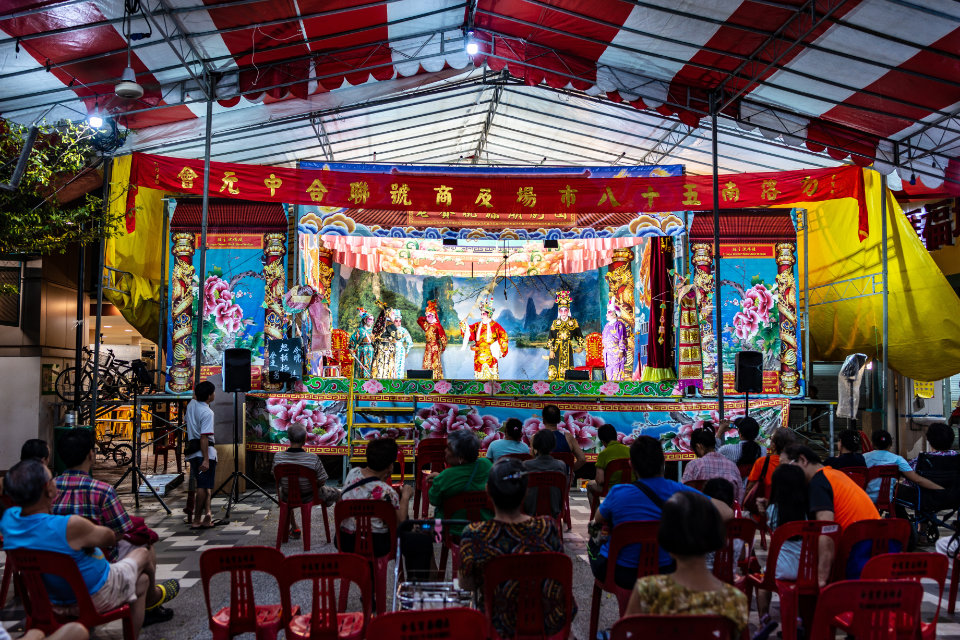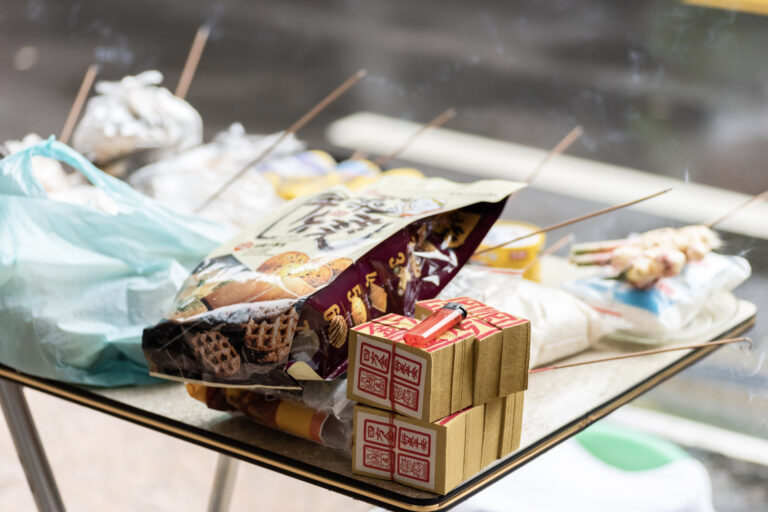The Hungry Ghost Festival, also known as Zhongyuan Festival (中元節) in Mandarin, is a traditional Buddhist and Taoist event celebrated in many East Asian countries.
The festival falls on the 15th night of the seventh lunar month, which is often called the Ghost Month, where it is believed the gates of hell are opened to allow ghosts and spirits to roam the earth.
Table of Contents
The Story Behind Hungry Ghost Festival
The origin of the festival is linked to the Buddhist scriptures and the story of Maudgalyayana (目连), a disciple of Buddha, who discovered his deceased mother had fallen into the realm of hungry ghosts.
He attempted to feed her, but the food turned into flames before reaching her mouth. Buddha advised him to offer food and gifts to the monks upon their return from their annual retreat on the fifteenth day of the seventh lunar month.
The merit gained from this would benefit all the deceased, including his mother. The practice evolved into the Hungry Ghost Festival, where people pay respects to wandering spirits and ancestors.
Important Dates for Hungry Ghost Festival
- In 2023: The Hungry Ghost Festival (中元節) falls on 30 August, with the ghost month spanning from 16 August to 14 September.
- In 2024: The Hungry Ghost Festival (中元節) falls on 18 August, with the ghost month spanning from 4 August to 2 September.
- In 2025: The Hungry Ghost Festival (中元節) will be on 6 September, and the ghost month will span from 23 August to 21 September.
Things to do during Hungry Ghost Festival
Paying Respects to Ancestors
People visit the graves of their ancestors to pay respects, clean the tombs, and make offerings of food and gifts. This practice is to express filial piety and keep ancestors’ spirits content.
Offering Food and Gifts to Wandering Souls
It is believed that the ghosts of those who have no descendants or were not given a proper burial roam the earth during this time.
To appease these wandering souls, food, and other offerings like clothes, money, and daily necessities made of joss paper are presented.
The Significance of Burning Joss Paper
Joss paper (金纸), also known as ghost or spirit money, is burned during the festival. It is believed that the paper will reach the spirits and provide them with wealth and necessities in the afterlife.
Releasing Water Lanterns
In some regions, people release lanterns on water bodies, guiding lost souls back to the underworld. This beautiful and poignant ritual is a highlight of the festival.

Praying Procedure and Offerings for the Hungry Ghost Festival: Deities (神明)
The offerings and prayer locations for the Hungry Ghost Festival vary depending on the object of worship; not every offering can be used for all gods!
For example, if you are worshiping the Earth Official (a deity), the preferred location for the prayer is the front door or a courtyard that’s visible to the sky. If there are other offering tables in the same place, its table should be separate and positioned on the outermost side. The recommended offerings include:
- Items: One pair of candlesticks, an incense burner, three realms currency paper, fresh flowers, three tea cups.
- Food: Vermicelli, foods representing the Five Elements (such as daylilies for metal, black fungus for wood, red dates for fire, mushrooms for water, and longan for earth), or 12 dishes (made from chicken, duck, fish, pork, vegetables, etc.), and round, seedless fruits.
- Paper Money: Tai Chi gold or Heavenly gold.
After the offerings are arranged, the chief worshipper lights three incense sticks, others light one, praying to the deity for family safety and success in work. When the incense burns down to two-thirds, grab the paper money, bow thrice, then burn it.
Praying Procedure and Offerings for the Hungry Ghost Festival: Ancestors (祖先)
If you’re worshiping ancestors during the Hungry Ghost Festival, the recommended location is the living room of your home. The suggested offerings include:
- Food: Cooked food dishes (6, 10, or 12 bowls, any even number), Three Sacrifices (chicken, pork, fish), fruits (preferably apples, pomelos, oranges symbolizing peace, fertility, and good luck), tea, and wine.
- Paper Money: Joss paper, large silver paper.
Light three sticks of incense, pray to the ancestors for family safety and satisfaction in all matters. After the incense burns down to two-thirds, pick up the joss paper from the table, bow thrice, then burn it.
Praying Procedure and Offerings for the Hungry Ghost Festival: Landlord Spirit (地基主)
Besides the ‘good brothers’, don’t forget to worship the Landlord Spirit during the Ghost Festival. The Landlord Spirit is said to be the guardian deity of each family, ensuring peace in the house.
The worship location is usually at the kitchen entrance or back door. Due to the smaller size of the Landlord Spirit, it’s recommended to use a low table to place the offerings, which include:
- Food: Home-cooked dishes (chicken legs, tea eggs are good), two bowls of rice (without sauce), two pairs of chopsticks, fruits, three cups of tea and wine.
- Paper Money: Joss paper, small silver paper.
Light three sticks of incense to pray for peace to the Landlord Spirit. When the incense burns down to two-thirds, then burn the joss paper.
Praying Procedure and Offerings for the Hungry Ghost Festival: ‘Good Brothers’ (好兄弟)
The place of worship for ‘good brothers’ must be an outdoor space outside the front door, otherwise, they will be blocked by the door gods. The recommended offerings include:
- Items: Clean basin and towel (onion and garlic added to the water in the basin, towel), wine cup, incense, triangular pennant (universal salvation flag).
- Food: Three Sacrifices (a whole chicken, a whole pig, a fish with tail) or Five Sacrifices (whole chicken, duck, fish, pig, and sausage), wine, biscuits, drinks, canned food, instant noodles, Four Fruits.
- Paper Money: Small silver.
The order to place the offerings is from the inside out: biscuits, instant noodles, etc., fruits, Three Sacrifices, tea, and wine. Each food should have an incense stick inserted, and the Universal Salvation flag is placed in one of the offerings.
A clean basin and towel are placed under the outermost table. The worshiper lights an incense stick to greet the ‘good brothers’ and can say, ‘Good brothers, hello! Today is the Ghost Festival, I have prepared some food for you to enjoy, I hope you are satisfied and wish you peace and satisfaction.‘ (好兄弟祢們好!今天是中元節,弟子準備一些食物給祢們享用,希望祢們滿意,也祝福祢平安順心.)
Avoid stating your full name.
After the first incense stick has burned down to two-thirds, light the second incense stick. Once it’s burned down to two-thirds, burn the paper money on the table (starting with the large papers), and invite the ‘good brothers’ to receive the small silver.
Finally, invite the ‘good brothers’ to leave, praying for peace in and out of the house.
Taboos for the Hungry Ghost Festival Prayers
- Paper money must be burned one by one, and after burning.
- The wine that was offered should be sprinkled on the ground (around the paper money) in three circles, but it should not be sprinkled on the paper money itself, otherwise the ‘good brothers’ will not be able to receive the small silver.
- For the Hungry Ghost Festival, sacrificial animals used in worship should remain intact; they should not be decapitated or have their tails cut off, as this implies “having no descendants”, symbolizing the end of the lineage.
- The number of fruits for the Ghost Festival should be odd. For the gods, try to use round, seedless fruits; when worshiping the ‘good brothers’, do not use ‘pineapple’, ‘banana’, ‘plum’, and ‘pear’, as they sound like ‘prosperity comes’, ‘inviting you over’, and others in Chinese.
- Avoid using pomegranates and tomatoes, as there’s a fear that the ‘good brothers’ will ‘rebel’ after eating them. However, mangoes, kiwis, and apples are good choices for offerings, as they wish the ‘good brothers’ to achieve their goals soon. They are also very suitable offerings for ‘good brothers’, wishing them to leave the ranks of novices soon.
- During worship, maintain a solemn attitude, and do not joke or act disrespectfully.
Dos and Don’ts during Hungry Ghost Festival
The festival comes with its taboos. Swimming is discouraged, as water spirits are believed to be active. One should also avoid taking photos at night, whistling, and stepping on or disturbing the offerings. Respect for the spirits and ancestors is important during this period.
Dos:
- Offer Food: Remember to offer food and prayers to the hungry ghosts and your ancestors.
- Burn Joss Paper: The burning of joss paper or ‘ghost money’ is an important ritual as it is seen as providing the spirits with income and material comfort in the afterlife.
- Provide Entertainment: In some communities, it’s common to have live performances like operas or puppet shows to entertain the spirits.
- Be Respectful: Always show respect towards offerings and altars you may encounter in public spaces.
- Use Incense: Lighting incense is a common way to pay respects to the ancestors and wandering spirits.
- Light Lanterns: Releasing lanterns into the water can help guide wandering spirits.
- Clean Ancestors’ Graves: Pay a visit to your ancestors’ graves, clean them, and make offerings.
- Be Charitable: It’s a good time to donate to charity or do good deeds, as it’s believed to bring good luck.
- Stay Positive: Maintain a positive and respectful attitude towards the festival and its rituals, even if you don’t fully understand them.
- Give Way to Spirits: Allow ‘space’ for spirits to enjoy the offerings and performances. For example, in Getai performances, the front row is often left empty for the spirits.
Don’ts:
- Don’t Go Out Late at Night: It is believed that ghosts are more active at night, so it’s advisable to return home early.
- Avoid Swimming: It’s said that spirits associated with water may try to drown humans in order to reincarnate.
- Avoid Taking Photos: Particularly at night, as it’s believed that spirits might show up in the photos, which could bring bad luck.
- Don’t Whistle or Make Unnecessary Noise at Night: This may attract ghosts to you.
- Avoid Stepping on Offerings: Watch your step and avoid disturbing or disrespecting offerings that may be on the streets or sidewalks.
- Avoid Wearing Red or Black: These colors are said to attract spirits.
- Don’t Hang Clothes Outside at Night: Clothes hanging outside are said to attract wandering spirits.
- Avoid Moving into a New House or Getting Married: These are considered major life events, and it’s usually advised to avoid holding them during the Ghost Month to prevent attracting unwanted spirit attention.
- Don’t Kill Insects: Some believe that spirits may visit in the form of moths or butterflies, so it’s best to avoid killing insects during this period.
- Avoid Picking Up Money Found on the Street: The money could be an offering for the spirits, and picking it up could bring bad luck.
- Don’t Clap or Tap on Someone’s Shoulder: These actions may ‘wake up’ or alert spirits, causing them to notice a person and follow them.
- Avoid Self-Reflection: Mirrors are believed to attract spirits. To avoid attracting ghosts, don’t stare into mirrors for too long, especially at night.
- Don’t Renovate: House renovations are considered inauspicious during the Ghost Month. It’s best to plan renovations before or after this period.
- Avoid Spilling Sauce or Gravy: Spilling these, especially soy sauce, is considered bad luck during the Ghost Month.
- Don’t Open Umbrellas Indoors: It’s believed that spirits may seek shelter under opened umbrellas, especially if they are opened inside a house.
- Don’t Pray to Borrow Luck From the Deceased During the Hungry Ghost Festival: The seventh lunar month, which is when the Hungry Ghost Festival takes place, is considered a time for appeasing the spirits and showing them respect. It’s seen as inappropriate and potentially dangerous to ask for personal gain such as luck from these spirits during this time. Instead, the focus should be on paying respects and ensuring the comfort of the spirits. It is always advisable to maintain respect and caution in your interactions with the spiritual realm.
Remember, the Hungry Ghost Festival is a time of respect and remembrance. Whether you fully observe these dos and don’ts or not, the essential thing is to respect the beliefs and practices of those who do.
The Significance of Live Performances (Getai)
In some countries like Singapore and Malaysia, live performances known as Getai are held. These include singing, dancing, opera, and puppet shows, which are meant to entertain both the living and the dead. Rows of empty front seats are usually reserved for the spirits.

Ghost Festival vs. Qingming Festival
While both the Ghost Festival (also known as the Hungry Ghost Festival) and Qingming Festival are traditional Chinese holidays centering around paying respect to the deceased, there are key differences in their purpose, practices, and timing.
- Purpose
- Ghost Festival: The Ghost Festival is observed during the seventh lunar month, also known as the Ghost Month. It’s believed that the gates of the underworld open during this time, allowing spirits and ancestors to visit the living. The festival is mainly for appeasing these wandering spirits, including those who may not have descendants to care for them, and to prevent any misfortune they might bring.
- Qingming Festival: The Qingming Festival, or Tomb-Sweeping Day, held in early April, is a time specifically for families to honor their individual ancestors. Families visit the gravesites of their ancestors to clean the tomb, present offerings, and pay their respects.
- Practices
- Ghost Festival: During the Ghost Festival, people make offerings of food, incense, and joss paper to the wandering spirits. They also burn hell bank notes and other forms of joss paper, which are believed to provide the spirits with currency in the afterlife. Some communities also organize entertainment like Getai performances, as they believe the spirits can enjoy these from the other side.
- Qingming Festival: On Qingming Festival, families journey to their ancestors’ gravesites to tidy up the area, removing any overgrowth and making repairs if necessary. They make offerings, such as the deceased’s favorite foods and drinks, and burn joss paper items. Unlike the Ghost Festival, these rituals are specific to the ancestors of each family.
- Timing
- Ghost Festival: The Ghost Festival takes place on the 15th day of the seventh month of the Chinese lunar calendar, usually falling in August or September in the Gregorian calendar.
- Qingming Festival: Qingming Festival happens on the 4th or 5th of April each year, based on the solar term ‘Qingming’, which indicates the time when temperature begins to rise and rainfall increases, marking the beginning of spring plowing and farming.
While both festivals share the theme of respecting and remembering the deceased, they are distinct in their practices and purposes.
One serves to honor the ancestors within one’s family line, while the other serves to placate all wandering spirits during a month of increased supernatural activity.
Reflecting on Traditions: The Deep Connections of the Hungry Ghost Festival
The Hungry Ghost Festival is an essential occasion that strengthens community bonds and familial piety while remembering and respecting the deceased. It serves as a potent bridge, linking the living with the departed and creating a bond that transcends the physical plane.
This festival of reverence, sacrifice, and remembrance provides us with an opportunity to reflect on our relationships, both with those who are still with us and those who have passed on. As we anticipate the Hungry Ghost Festival in 2023, we gain a deeper appreciation for its cultural heritage and the lessons it imparts.
Here’s an intriguing question to ponder: How can embracing the traditions and values inherent in the Hungry Ghost Festival enrich our lives and relationships?
Could this connection to the past, coupled with respect for the unseen world, foster greater harmony and understanding in our own lives? Reflect on this as we move closer to the festival this year.
What is the Hungry Ghost Festival?
The Hungry Ghost Festival is a traditional Chinese festival that honors the spirits of deceased ancestors. It is believed that during this month, the gates of the afterlife are opened, and spirits are free to roam the Earth. The festival involves offerings, prayers, and rituals to appease these spirits.
When is the Hungry Ghost Festival celebrated?
The Hungry Ghost Festival is celebrated on the 15th night of the seventh month in the lunar calendar, which usually falls in August or September.
What are some common practices during the Hungry Ghost Festival?
Common practices during the festival include making offerings of food and drinks, burning incense and joss paper, releasing paper lanterns, and performing live shows and rituals. It’s also common to avoid certain activities to not disturb or offend the spirits.
What are some dos and don’ts during the Hungry Ghost Festival?
During the festival, it’s important to show respect for the spirits by making offerings and avoiding actions that might disturb them, such as stepping on offerings or whistling at night. It’s also considered bad luck to move house, start a new job, or get married during this time.
Why is the Hungry Ghost Festival important?
The Hungry Ghost Festival is important because it’s a time to honor and remember the deceased. It reinforces the values of respect for ancestors, community bonds, and family piety. The festival also provides an opportunity for reflection on life and death and our connections to those who came before us.
What is the significance of food offerings during the Hungry Ghost Festival?
Food offerings are made during the Hungry Ghost Festival to appease the hungry ghosts. It’s believed that these offerings provide sustenance for the spirits and also earn merit for the living.
Can non-Chinese people participate in the Hungry Ghost Festival?
Yes, the Hungry Ghost Festival is a cultural event that anyone can observe or participate in. However, it’s important to approach it with respect and understanding of its traditions and beliefs.
How can Feng Shui help during the Hungry Ghost Festival?
Proper application of Feng Shui during the Hungry Ghost Festival can help create a harmonious environment that’s conducive to spirit worship and helps ensure peace and balance in the home. This can involve the strategic placement of offerings, using auspicious symbols, and following certain Feng Shui principles in regards to color, elements, and more.



